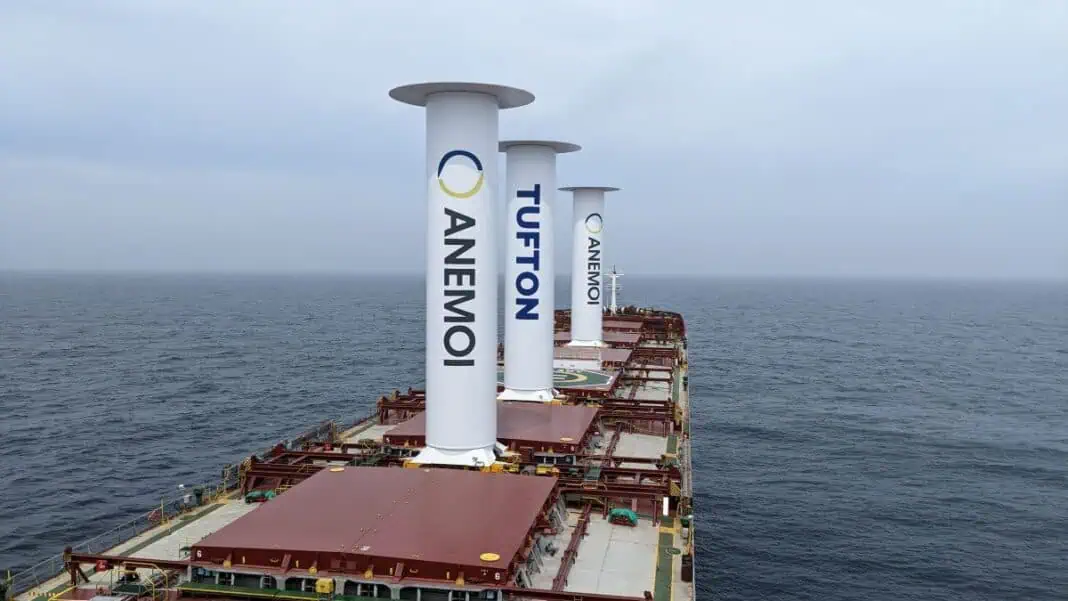Anemoi Marine Technologies, a pioneer in wind-assisted propulsion, announce the successful independent verification of its Rotor Sail system’s performance by Lloyd’s Register Advisory. Following nearly a year of rigorous testing aboard the TR Lady—a Kamsarmax bulk carrier owned by Tufton Investment Management Ltd and chartered by Cargill—the results validate Anemoi’s methodology for calculating fuel savings and emissions reductions, setting a new benchmark for wind propulsion technology.
The three 24-meter Rotor Sails installed on the TR Lady generated extensive real-world operational data across diverse conditions. Lloyd’s Register’s Statement of Fact confirms the system’s repeatable performance, providing shipowners and operators with a trusted framework to assess the economic and environmental benefits of wind-assisted propulsion.
During the testing period, TR Lady sailed the Indian Ocean, South Atlantic, North and South Pacific, Southern Ocean and rounded both the Cape of Good Hope and Cape Horn, along with some of the busiest shipping routes, including the Strait of Malacca. Data from eight consecutive Laden and Ballast legs were analysed to provide a long-term average of the fuel and emissions savings. The average net savings across this period calculated from the verified performance model were 1.9 tonnes of fuel per day and 7.0 tonnes of CO2 per day (well-to-wake). This equates to an average of 9.1% net propulsion fuel and emissions savings.
The achieved average savings align closely with Anemoi’s predicted 10% savings, making this a very positive result. Additionally, since TR Lady does not follow a fixed route, the results varied from voyage to voyage depending on the route taken and the wind conditions encountered. For example, on a 22-day voyage across the North Pacific, average route savings of 21% net propulsion fuel reduction were calculated from the verified performance model. That said, it is especially important to Anemoi to share the full, transparent picture in the first instance, rather than focusing solely on one particularly favourable route, to provide a more relevant measure of long-term performance.
Lloyd’s Register Advisory confirmed that the findings of this study validate Anemoi’s approach as a reliable method for calculating Rotor Sail performance. The Statement of Fact concluded that “there is close agreement between the predicted thrust coefficient trends and the measured values”. Dr Dogan Uzun, Ship Performance Consultant at Lloyd’s Register Advisory and project manager of the assessment, said, “We have independently verified Anemoi’s methodology to calculate thrust power and predict fuel consumption, confirming its accuracy when ship-specific coefficients are correctly applied and kept up to date. Our assessment, drawing on high-frequency operational data and CFD analyses for rotor sail-equipped vessels, highlights the value of detailed, vessel-specific modelling. The findings show that wind-assisted propulsion, when supported by robust data and transparent methods, can significantly reduce uncertainty and contribute meaningfully to emissions reduction in commercial shipping.”
TR Lady, an 82k DWT Kamsarmax, was installed in June 2023 with three Anemoi Rotor Sails, 5m in diameter and 24m in height – a shorter height and a lower aspect ratio compared to Anemoi’s standard products to suit air draft requirements. Anemoi has also confirmed that testing is currently underway on several vessel installations featuring its larger Rotor Sails, measuring 35m in height, which, thanks to their higher aspect ratios, are expected to achieve even higher performance results.
Clare Urmston, CEO of Anemoi Marine Technologies, said, “This independent verification is a crucial step in building trust across the industry. Lloyd’s Register Advisory’s rigorous and transparent approach gives shipowners and operators the confidence that our technology delivers measured fuel savings and emissions reductions in line with expectations. At Anemoi, we believe that credibility is earned through data, openness and accountability, and this verification underpins our commitment to setting a new standard as emerging technologies like wind propulsion pave the way in clean maritime innovation.”
“Verifying the performance of Rotor Sails has been a key objective of this project for Tufton. The latest fuel consumption calculations, following the methodology independently verified by Lloyd’s Register Advisory, closely match our original expectations. We are excited by the results, which not only confirm the technology’s effectiveness but also the strong operational and environmental benefits we anticipated,” shared Nicolas Tirogalas, Chief Investment Officer and President of Tufton.
Chris Hughes, Decarbonisation Specialist of Cargill, said, “Building up an accurate understanding of the real-world, on-ship performance of technologies is a key piece in the wind assist propulsion puzzle. By combining the data from more than 167 rotor on/off tests that were conducted by the TR Lady, together with the independent verification from LR, Anemoi installed confidence in the accuracy of their analysis. We have already used the results of this study to fine-tune our weather routing digital twins for TR Lady; and it will also help inform future decisions on deploying wind assist across our fleet.”
With over a decade of continuous operational data gathered from installations and test sites since 2013, Anemoi is one of few in the industry backed by such an extensive knowledge base. Drawing on this expertise, Anemoi is committed to transparently sharing real-world performance data from vessels equipped with its Rotor Sail technology.












